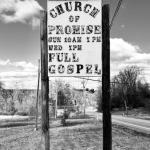A theme I have been playing around with in 2024 was the theme of loneliness. I want to continue this theme in 2025 and talk about building community in a world of brokenness and separateness.
A Deer Hit My Car and Temporarily I Joined a Tribe
In almost 30 years of driving, I finally had an incident with a deer. Now, I did not hit the deer, the deer hit me. Like ran right into the front passenger quarter panel of my car. He was a big buck too, made antler imprints on my hood. Fortunately, my insurance was super easy to work with and I was in a rental within a few hours.
The car the rental company gave me was a Jeep Wrangler. I have always wanted a Jeep. In high school, I remember listing the Jeep as my dream car. Driving this car around has been a dream come true for me. An unexpected experience from this was the tribe that I stumbled upon. The first day I had the Jeep, I noticed how many other Jeep owners gave me the two finger off the steering wheel wave, this must be the universal sign, kind of like the wave motorcyclists give to each other.
This newfound sense of connectedness reminds me of the ongoing struggle I see daily the many people I work with who are struggling not only with communal connection but spiritual connection. As a therapist and social worker seeped in the tradition of systems theory, I understand systems to be integral in sustaining our wellbeing and overall sense of self. A spiritual connection is essential to connect us either to our spiritual selves or our connection to our understanding of God.
We make connection very difficult by the nature of us being human. Humans are picky, finicky, tribal and clicky people. We let our egos get in the way and when we do this, we sow division among ourselves and leave people disconnected and wounded.
Merton’s Mystical Experience
A reminder that I come back to regularly to remind me of my interconnectedness with all God’s creation is Thomas Merton’s 4th and Walnut mystical experience.
In his famous experience captured in Conjectures of a Guilty Bystander, he offers us this:
“In Louisville, at the corner of Fourth and Walnut, in the center of the shopping district, I was suddenly overwhelmed with the realization that I loved all those people, that they were mine and I theirs, that we could not be alien to one another even though we were total strangers. It was like waking from a dream of separateness, of spurious self-isolation in a special world, the world of renunciation and supposed holiness… This sense of liberation from an illusory difference was such a relief and such a joy to me that I almost laughed out loud… I have the immense joy of being man, a member of a race in which God Himself became incarnate. As if the sorrows and stupidities of the human condition could overwhelm me, now I realize what we all are. And if only everybody could realize this! But it cannot be explained. There is no way of telling people that they are all walking around shining like the sun.”
Thomas Merton’s mystical experience in downtown Louisville, offers us several profound insights into belonging:
Transcending Separation: Merton’s experience ruptured his sense of isolation and separation from others. It revealed the underlying interconnectedness of all beings, highlighting that true belonging stems from recognizing our shared humanity.
We are all part of the human race, all running towards the same end. We are in this boat together. We all love; we all have low moments. We are all human and this Humanness is what connects us. Rather than create walls that divide us, we need to reach out to each other and explore and celebrate our commonalities.
The Illusion of Individuality: The experience challenged the notion of a separate, isolated self. It suggested that our true selves are deeply intertwined with the larger web of existence, dissolving the illusion of individual autonomy. This truly goes against the American sense of individuality.
Love as the Foundation of Belonging: Merton’s experience was characterized by a sudden surge of love for all humanity. This emphasizes that love, compassion, and empathy are the foundations of true belonging – a sense of connection that transcends superficial differences. In practicing this intentionally over the last several years, I find it very difficult to be truly frustrated with people.
Finding the Sacred in the Everyday: In a busy daytime street with all the city business all around him, Merton demonstrates for us that true belonging can be found not just in exclusive communities or religious settings, but in the everyday encounters and interactions with others. Much of my profound spiritual experiences do not happen on church on Sundays, but rather in my day to day interactions with people in and out of my office.
Finally, Merton’s experience reminds us that true belonging is not about finding a place to fit in, but about recognizing the inherent interconnectedness of all beings and cultivating love and compassion towards others. It encourages us to see the divine in the ordinary and to embrace the diversity of human experience as a source of richness and connection.
Rebuilding our Connection Through the Spiritual Practices of Compassion Hospitality and Meaning
My wife told me that my car will be repaired in two weeks and I should have it back. As with all journeys in life, whether college, my youth ministry days, my college ministry days or even preaching in a church, or ultrarunning, our tribes sometimes change, and we are left looking for a new one. (more here).
Life is a journey, not a destination, everyday must be an intentional movement forward towards connectedness with those around us.
As a behavioralist, I am continually looking for and connecting points to help me understand my world and the world of the clients and people I work with. When we strive towards an open mind, move towards meaning, we create a sense of understanding that increases the depth and richness of our life. Since beginning the practice of seeing the commonality of all people with my own human experience, I find connection with even the most agitating people. For whatever reason, one that I do not know, this person is agitated and me leveling up to their agitation is not going to do anything to make it better. Sitting with this with a peaceful heart, practicing compassion and making space for this negative energy with create a better resolve.
Finally, let us consider the practice of hospitality. When we welcome the unwanted and misunderstood in our space, we enhance our tolerance and confront any hostility or criticism that may dwell within us. As our world continues to evolve, having an attitude that says, “that is not the way we do it here” no longer flies. Hospitality requires that we must cross these boundaries, reach across the aisle and ask instead, “why do you do it that way?”.
You do not have to be a Christian mystic to see people the way Merton did. All you must do is put away your ego and open the eyes of your heart. Or perhaps, see people as young children do, with a sense of wonder and curiosity. When we learn to connect with others, we learn to connect with ourselves and our spirituality.












